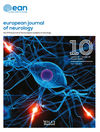|
Journal
European Journal of NeurologyMore Press Releases related to this journalEdited By: Tony H Schapira
Print ISSN: 1351-5101 Online ISSN: 1468-1331
Published on behalf of European Academy of Neurology
Impact Factor: 4.621

More Press Releases in: |
Media ToolkitContact Publicity to:
|
Patients with Multiple Sclerosis in Taiwan May Be at Increased Risk of Developing Cancer
Individuals with multiple sclerosis may have an increased risk of developing any type of cancer, with an especially high risk of developing breast cancer. That is the conclusion of a recent study published in European Journal of Neurology. Because the findings contradict earlier studies, additional research is needed to determine whether a true link exists between multiple sclerosis and cancer.
Previous research suggests that some individuals with autoimmune diseases may have an increased risk of developing cancer, but most studies have found no link between cancer and multiple sclerosis, an autoimmune disease that involves the central nervous system.
To investigate further, Li-Min Sun, MD, of the Zuoying Branch of Kaohsiung Armed Forces General Hospital in Kaohsiung, Taiwan, and his colleagues assessed data from the National Health Insurance System of Taiwan, including information on 1292 patients who were diagnosed with multiple sclerosis between 1997 and 2010. Each patient was matched with four participants without the condition.
“Our study was a nationwide population-based cohort study, and it revealed unexpected findings,” said Dr. Sun. Specifically, the team found that individuals with multiple sclerosis were 85% more likely to develop cancer than the controls. Their risk of developing breast cancer was especially high, with more than a 2-fold increased risk over controls.
The findings suggest that patients with multiple sclerosis patients may need to be monitored closely to ensure early detection of cancer. Dr. Sun notes that it is unclear why his team’s results are not consistent with most other studies. “The underlying genetic and environmental factors in Taiwan, which differ from those of western countries, might play an undetermined role. Additional large-scale studies will help improve our understanding,” he said.


